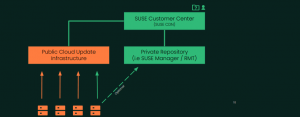Adding LTSS to SLE 12 on the Public Cloud for PAYG / On-Demand workloads
This blog applies to customers running SUSE Linux Enterprise Server 12 (SLES 12) or SUSE Linux Enterprise Server for SAP Applications 12 (SLES for SAP 12) and purchasing SUSE subscriptions via the cloud provider (AWS, Azure or GCP), this is often referred to as PAYG, on-demand, etc.
It was nearly 10 years ago when I was talking to customers about the launch of SUSE Linux Enterprise Server 12, at the time we talked about the lengthy 13 year support life cycle available to SLE customers, 10 years of general support with an additional 3 years of Long Term Service pack Support.
Nine and a half years on, many cloud customers are still enjoying the secure and stable platform SLES 12 and SLES for SAP 12 offers for hosting applications in the cloud, but the 10 year general support period ends on 31st October 2024, and there is now a choice to make.
Choice 1 – Upgrade
For most, it is to upgrade to the latest version, SLE 15 SP5 at the time of publishing (with SLE 15 SP6 around the corner). It’s here you’ll get some of the latest developments unlocking greater instance type support in the cloud and new product features. SUSE provides tooling to upgrade a PAYG cloud instance to the next major release and the next service pack.

Distribution Migration System (DMS) will help cloud customers update from SLE 12 to SLE 15
and zypper, SUSE’s package management tooling will help upgrade to the next Service Pack with:
'zypper migration’
Note that DMS is an offline upgrade, so you should plan for some interruption to service whilst you perform the update.
You can check the following links for more information on how to use DMS and the SUSE Life cycle
Choice 2 – Extend the SLE 12 life cycle with LTSS
There will be some cloud customers who need to stay on SLE 12 beyond the general support period, this is either due to application requirements or because more time is needed to plan an upgrade to SLE 15.
For those customers, SUSE offers LTSS (Long Term Service pack Support). You can learn more about LTSS here.
Let’s take a look at how PAYG customers can get LTSS updates.
Delivering LTSS to PAYG Customers.
Delivering LTSS updates in for PAYG cloud customers has in the past involved building a private repository such as SUSE Manager, this works well, but involved a little effort in order to setup and configure. However, there are new capabilities coming from SUSE’s cloud engineering team which will help make things much smoother.
How to get the LTSS Patches?
Currently, when under general support, PAYG cloud customers by default, get updates from the Public Cloud Update Infrastructure (a set of SUSE maintained servers residing in AWS, Azure and GCP).
As of now, the plan is that by the end of this summer, customers with valid LTSS Subscriptions will also be able to get LTSS patches for instances from SUSE’s Public Cloud update infrastructure. Of course, there will always be the option to host a private repository such as SUSE Manager to help add some control to the patching process, but it will be an option rather than a necessity for PAYG cloud customers that need LTSS.

Summary
If you are a cloud PAYG SLES or SLES for SAP Customer on SLES 12 or SLES for SAP 12 and need access to LTSS patches to give you more time to plan your upgrade, know that SUSE is working to make this easier. With new ways to purchase LTSS via the cloud providers and new ways to deliver the patches via SUSE’s Update Infrastructure, this should be relatively straightforward, with little change to your operational processes for maintaining and supporting SUSE Linux Enterprise products in the cloud.
Contact your Sales team or the Cloud team at SUSE – cloudsales@suse.com if you need further details and check back here for more detailed information on how this works as we get nearer to launch.
Note: This blog contained forward looking information which may change.
Related Articles
Jun 29th, 2023
It’s THE time: SUSE doc survey 2023 ‘call to action’
Jun 28th, 2023
SUSECON 2023 – It’s all about choice
Oct 03rd, 2022